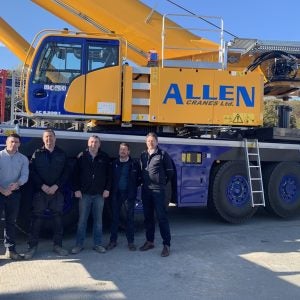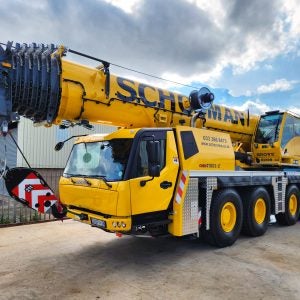HEWDEN Crane Hire of the UK has contracted out service and maintenance responsibilities for its mobile cranes at two depots to Demag Mobile Cranes.
The initiative involves 37 mobile cranes out of Hewden’s 300-strong rental fleet. The depots concerned are both in the London area – Heathrow to the west and Dartford to the east.
If the new partnership proves happy and successful, it could ultimately lead to Hewden sourcing its machines exclusively from Demag, except for niche products outside of its range.
The increasing technical complexity of modern cranes, particularly those of Demag and Liebherr, is stretching the capability of customers to service their own machines. Hewden believes that by retaining a manufacturer to maintain the equipment, costs will be reduced and standards of maintenance will improve, thus improving the service offered to its customers.
Demag will be looking after a range of brands for Hewden but over time, as the fleet is renewed – assuming the relationship flourishes – the proportion of cranes supplied by Demag will rise. Already this year Hewden has ordered 31 cranes from Demag, the bulk of these destined for the two London depots.
Hewden’s vision is to keep its fleet young and buy cranes – Demags, as far as possible – with extended warranties.
Demag Mobile Cranes managing director Uwe Muller said: ‘We are delighted to co-operate with Hewden Crane Hire in new and innovative means to consolidate technical and maintenance requirements of cranes. This will have an important influence to provide their clients with the most modern, safe and reliable crane fleet and lead to an even closer partnership and better understanding by the manufacturer of the operational requirements of the user.’
He added: ‘Hewden Crane Hire is also discussing other new models with Demag which will keep them in the forefront enabling clients to gain advantage of latest technology.’
Hewden Crane Hire director and general manager Alex Lowe described the arrangement as ‘an informal agreement at the moment’. Outsourcing maintenance to a manufacturer had not been done in the crane industry before, he said. ‘We are treading very cautiously. We’re partly writing it as we go along.’
The idea, he said, came from a visit to the UK’s leading road haulier Eddie Stobart a few years ago. ‘He doesn’t service any of his wagons himself,’ Lowe said.
Lowe was also anxious to dispel the continued speculation about parent company Hewden Group’s commitment to the crane business since its acquisition in 2000 by Caterpillar dealer Finning International. ‘An investment of £8m in new cranes is clearly not the action of a company that is not here for the long haul and plainly demonstrates the commitment from both Hewden and Finning International to the future prosperity of the company.’
Group chief executive Paul Jarvis added: ‘Hewden endeavours to provide an excellent lifting service helped by having what will be the youngest mobile crane fleet in the industry.’
There was no comment about firmer speculation that Hewden is about to sell its tower crane business, a rental fleet of 170 Wolff cranes, to concrete contractor PC Harrington.
However, an indication that Finning’s vision for Hewden is wider than simply using it as an outlet for Caterpillar equipment came last month when it acquired most of the assets of general rental company Maxxiom, the company created in 1997 from the merger of the equipment operations of contractors Tarmac and Bovis. The £18m ($27m) acquisition includes about 13,000 items of equipment including goods and passenger hoists, accommodation and general plant operated from six depots. ‘This is not the action of a company focused only on Caterpillar,’ said one senior employee.






